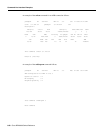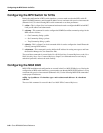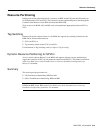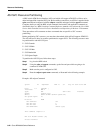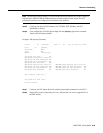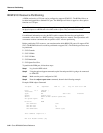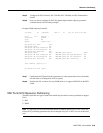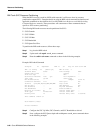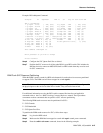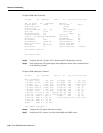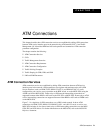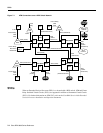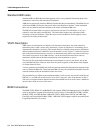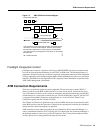
6-46 Cisco BPX 8600 Series Reference
Resource Partitioning
BNI Trunk SVC Resource Partitioning
When the BNI is used as a trunk in a BPX switch network, it will have to have its resources
partitioned to support SVCs. Complete details on using the BPX switch command line interface and
applicable commands are described in the Cisco BPX 8600 Series Reference and WAN Switching
Command Reference manuals. These procedures will concentrate on those commands that are
specific to SVC resource partitioning.
The following BNI trunk resources must be partitioned for SVCs:
• SVC Channels
• SVC VPI Min
• SVC VPI Max
• SVC Bandwidth
• SVC Queue Pool Size.
To partition the BNI trunk resources, follow these steps:
Step 1 Log in to the BPX switch
Step 2 Up the trunk with uptrk <trunk_num> command.
Step 3 Enter the cnftrk <trk num> command as shown in the following example:
Example: BNI cnftrk Command
swong135 VT SuperUser BPX 15 9.1 Sep. 24 1997 07:42 GMT
TRK 5.1 Config T3 [96000 cps] BNI-T3 slot: 5
Transmit Rate: 96000 Line framing: PLCP
Subrate data rate: -- coding: --
Line DS-0 map: -- CRC: --
Statistical Reserve: 1000 cps recv impedance: --
Idle code: 7F hex cable type:
Max Channels/Port: -- length: 0-225 ft.
Connection Channels: 1771 Pass sync: Yes
Traffic: V,TS,NTS,FR,FST,CBR,VBR,ABR Loop clock: No
SVC Vpi Min: -- HCS Masking: Yes
SVC Channels: -- Payload Scramble: No
SVC Bandwidth: -- cps Frame Scramble: --
Restrict CC traffic: No Virtual Trunk Type: --
Link type: Terrestrial Virtual Trunk VPI: --
Routing Cost: 10 Deroute delay time: 0 seconds
This Command: cnftrk 5.1
Stat Reserve (1000):
Virtual Terminal
Step 4 Configure the SVC Vpi Min, SVC Channels, and SVC Bandwidth as desired.
Step 5 Next configure the SVC Queue depth with cnftrkparms <trunk_num> command shown
in the following example:



